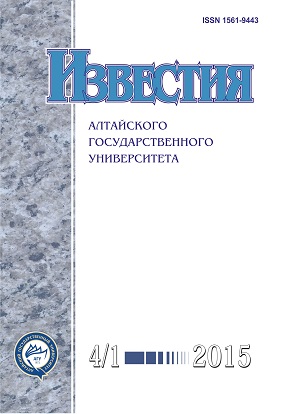The Influence of the Military Factor on Process of Early State Formation in Ancient Israel
Abstract
The article analyzes one of the important factors that affected process of the statehood formation in ancient Israel. The military factor had an impact on various structures (social and political life, the economy, material culture) of ancient Israel society in the process of formation of the Jewish state. External threats and a series of wars became a catalyst for socio-political process which resulted in the consolidation of ancient Jews, the emergence of the main leader and his military team, and then the creation of a professional army, changes in the economy and material culture. There were created necessary conditions for the integration of the Jewish tribes which were united in the ethnical-religious alliance, with the following emergence of chiefdom in the 2nd half of the XIth BC, and then its transformation into early state in the 1st half of Xth century BC. The Requirements of the military leader and professional army affected agricultural development. The army needed surplus product. The material culture also varies. Safety threat promoted urbanization and fortification development, followed by strengthened cities. The necessity for the weapon triggered the development of craft production in towns.
DOI 10.14258/izvasu(2015)4.1-11
Downloads
Metrics
References
Тюменев А.И. Евреи в древности и в средние века. Репринтное издание. - М., 2003.
Вейнберг И.П. Царская биография на Ближнем Востоке середины I тыс. до н.э. // Вестник древней истории. - 1990. - № 4.
Noth M. The History of Israel. - L., 1960.
Shiloh // The new Encyclopedia of Archaeological Excavations in the Holy Land. - V. 4. - Jerusalem, 1993.
Шифман И.Ш. Государство в системе социальных институтов в древней Палестине (вторая половина III - первая половина I тыс. до н.э.) // Государство и социальные структуры на древнем Востоке // Сборник статей. - М., 1989.
Herrmann S. A History of Israel in Old Testament Times. - Philadelphia, 1981.
Halpern B. The Emergence of Israel in Canaan. Chico - California, 1983.
Gottwald N.K. The Participation of Free Agrarians in the Introduction of Monarchy to Ancient Israel: An Application of H.A. Landsberger’s Framework for the Analysis of Peasant Movements // Social Scientific Criticism of the Hebrew Bible and Its Social World: The Israelite Monarchy. Ed. N.K Gottwald. Semeia (37). Decatur. - Georgia, 1986.
Flanagan J.W. Chiefs in Israel // Community, Identity, and Ideology: Social Science Approaches to the Hebrew Bible / edited by Charles E. Carter and Carol L. Meyers. - Indiana, 1996.
Тантлевский И.Р. История Израиля и Иудеи до разрушения первого храма. - СПб., 2007.
Faust A. Abandonment, Urbanization, Resettlement and the Formation of the Israelite // Near Eastern Archaeology. - 2003. - Vol. 66. - № 4.
McNutt P.M. The Forging of Israel. Iron Technology, Symbolism, and Tradition in Ancient Society. - Sheffeld, 1990.
Мазар А. Археология библейской земли. - Иерусалим, 1996. - Т. 2.
Garfinkel Y, Ganor S. Khirbet Qeiyafa. Vol. 1. Excavation Report. 2007-2008. - Jerusalem, 2009.
Izvestiya of Altai State University is a golden publisher, as we allow self-archiving, but most importantly we are fully transparent about your rights.
Authors may present and discuss their findings ahead of publication: at biological or scientific conferences, on preprint servers, in public databases, and in blogs, wikis, tweets, and other informal communication channels.
Izvestiya of Altai State University allows authors to deposit manuscripts (currently under review or those for intended submission to Izvestiya of Altai State University) in non-commercial, pre-print servers such as ArXiv.
Authors who publish with this journal agree to the following terms:
- Authors retain copyright and grant the journal right of first publication with the work simultaneously licensed under a Creative Commons Attribution License (CC BY 4.0) that allows others to share the work with an acknowledgement of the work's authorship and initial publication in this journal.
- Authors are able to enter into separate, additional contractual arrangements for the non-exclusive distribution of the journal's published version of the work (e.g., post it to an institutional repository or publish it in a book), with an acknowledgement of its initial publication in this journal.
- Authors are permitted and encouraged to post their work online (e.g., in institutional repositories or on their website) prior to and during the submission process, as it can lead to productive exchanges, as well as earlier and greater citation of published work (See The Effect of Open Access).








